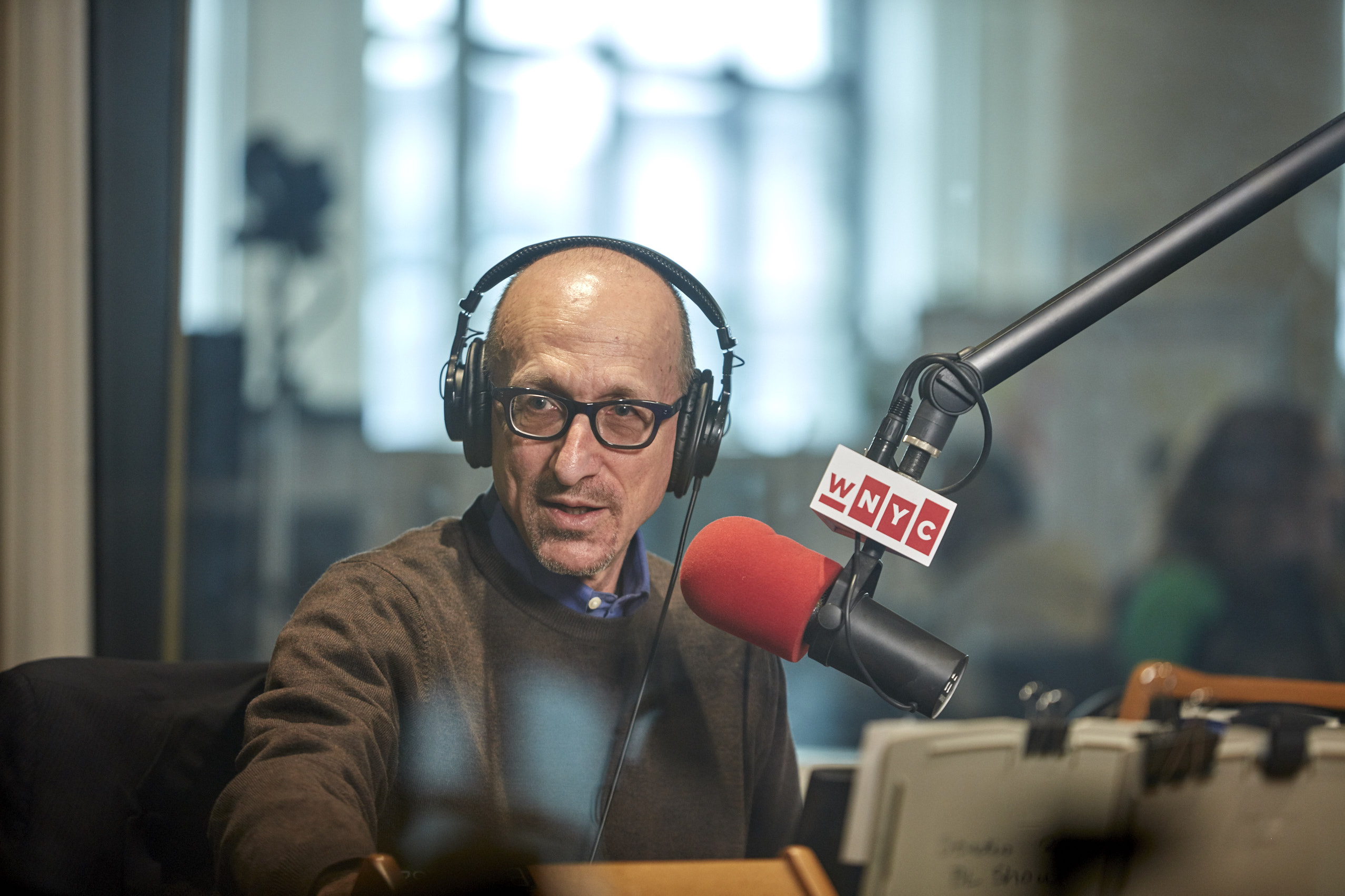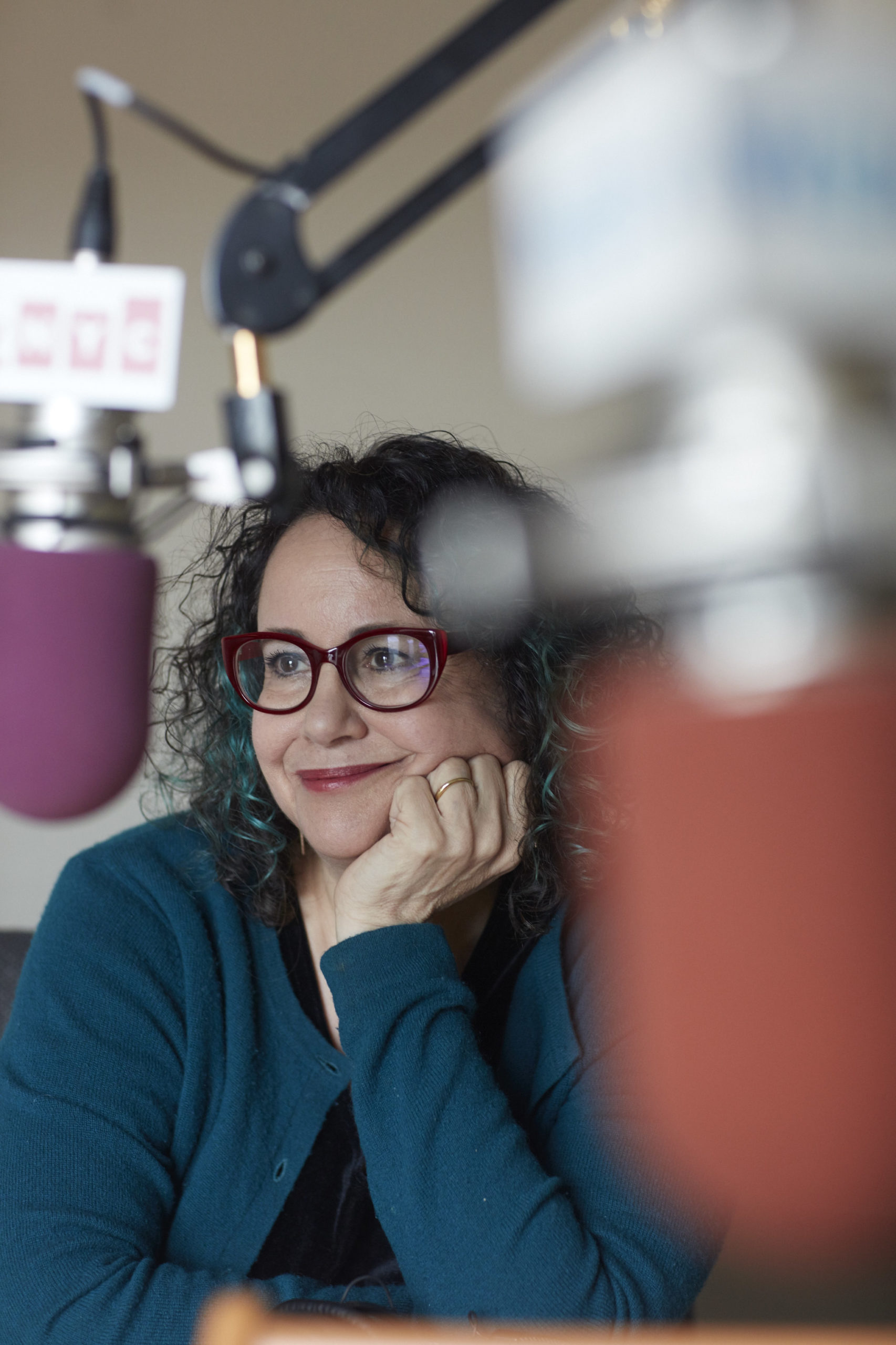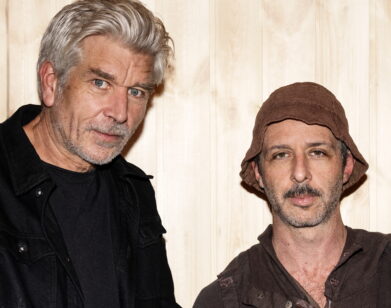ON AIR
Brian Lehrer Points the Mic at Brooke Gladstone
Brooke Gladstone and Brian Lehrer have been two of the most recognizable voices on the New York City airwaves for decades, sharing neighboring offices in the WNYC studios while stewarding citydwellers through the day’s civic and political affairs. After years working in print media, cable news, and public radio both at home and abroad, Gladstone took over Lehrer’s post on On The Media, becoming the show’s first full-time host and a giant in the emerging field of media criticism. During her tenure, Gladstone has seen and reported on sweeping changes in the way we consume news, penned two critically acclaimed books, and grown OTM into a nationally syndicated juggernaut. After she was honored at WNYC’s annual gala, Gladstone sat down with her longtime friend and host of The Brian Lehrer Show to interview each other about parasocial relationships, the cult of objectivity, and the enduring power of radio. —CAITLIN LENT
———
BROOKE GLADSTONE: Who starts, Brian?
BRIAN LEHRER: Who starts when you have two interviewers in the same interview? Both of our impulses would be to start. To serve rather than receive. Would you like the honor?
GLADSTONE: No, you go ahead. You’re better live.
LEHRER: I’ll reach back into a little bit of Brooke history, the pre-history of just before we met. You were working for NPR as their first ever full-time media correspondent. That much I know.
GLADSTONE: I was able to work in New York, which is why when that job came along, I decided to take it. Prior to that, I had been an editor for most of my time at NPR [in Washington, D.C.], and then for three years as the Moscow correspondent.
LEHRER: That was the mid-nineties, right? And at that point, or I should say only at that point, did NPR decide to establish a position of a full time media correspondent. What was going on at that time that triggered that?
GLADSTONE: I was in Moscow, so I don’t remember much, but there was suddenly a proliferation of cable services. That wasn’t brand new, but suddenly everything was moving to that space. We also had the rise of digital media. Matt Drudge was a huge thing. All sorts of people were beginning to migrate to the web, if not as a primary source of information, a prominent one. And suddenly it seemed like there was much to say.
LEHRER: 1995 is sometimes mentioned as the year that the World Wide Web as we know it was really launched. Obviously that was a pivotal moment.
GLADSTONE: Now, how about you prior to The Brian Lehrer Show? I know that you are a native Queensian and that your interests ranged from music to public health. Tell me how you wound up at WNYC.
LEHRER: The short version is, I grew up in Queens listening to a lot of radio, both music and news. My parents were politically aware and musical. In college I kind of majored in the campus radio station and minored in my courses. I was doing both music and news, but primarily music. After college I got what I thought was my dream job, which was an FM rock show on an Albany radio station. And they told me that it was a six-day-a-week job. So besides my five-day-a-week music show, I had to do something on the weekends. And I said, “Well, can I come in just late Sunday night and open the phones?”
GLADSTONE: Wow.
LEHRER: And to my shock they said yes. The reason was that in those days, even music radio stations needed some kind of public affairs credit with the FCC to maintain their licenses. That requirement went away eventually in the Reagan years, but this was just before the Reagan years. And so we had a match there. After a little while, I discovered that I was putting more energy into my once-a-week, middle-of-the-night call-in show than my five-day-a-week, five-hour-a-day music show. So I decided to go back to school for a master’s in journalism and really focus on broadcast news. And from there I gradually wound up at WNYC.
GLADSTONE: Wow, that is interesting. And a lot of stuff I didn’t know. Surely you’re familiar with Donald Fagan’s song, “The Nightfly.” It’s about a late-night DJ who opens the phones and some of the saddest and strangest voices come through.
LEHRER: Well, the thing that landed me in the Albany papers from that show was not anything incisive that I said about politics or the world. It was when I had a suicide call from a listener and another alert listener called the cops who came to the studio and asked me to keep the guy on the line and try to find out his address, which I managed to do. And the cops got there just as he was trying to hang himself from a tree and they saved his life.
GLADSTONE: It also may have been how you found out what the power of radio can be. You saved a life
LEHRER: I feel like I was a bystander, but it was probably more formative than I ever thought about at the time in terms of approaching the talk show that I have at WNYC as not just something that’s public affairs in an intellectual sense, but that’s relational, a community building exercise, a tiny little relationship with each caller.
GLADSTONE: What they call nowadays a parasocial relationship. There’s more intimacy on the side of the listener than on the side of the speaker necessarily because we reveal so much more of ourselves than they are able to reveal of themselves. But nevertheless, there is a relationship and it’s one of trust and curiosity and, not to get too sticky, of service.
LEHRER: As it is in your case. You go deeper than people even think you’re going to go when they’re listening to On the Media.
GLADSTONE: I’m grateful for On the Media for forcing me to think deeply. Otherwise, I’d probably spend a lot more time skating across the surface of things. But I have a very low threshold when it comes to boredom, and I don’t want to tell anybody anything that they already know.

LEHRER: Well, I think it’s a privilege and a benefit of the jobs that we both have that they prompt us toward curiosity. One example in your case is that you wrote a book called The Trouble with Reality.
GLADSTONE: The Trouble with Reality: A Rumination on Moral Panic In Our Time, which was consciously highfalutin.
LEHRER: What led you to that and what did you mean by moral panic?
GLADSTONE: It was right after President Trump was elected. And those of us who live on the coasts and in large cities were conscious of a high-pitched scream, a wail as it were, coming from households and everywhere across the country, “What the fuck just happened? This wasn’t supposed to happen here.” And they said, “We want you to write something about that.” And I said, “I know how the publishing business works. I write something, it takes two years to come out, the world has already changed three times. I will write this monograph in two weeks and you have to bring it out in two months.” And they did. I was answering the question, “What happened?” We’ve all had presidents elected that we weren’t crazy about. And I’m not a spring chicken, I’ve seen decades of presidential cycles and I’ve had my fair share of profound disappointments, but this, this was something else. And so the question I asked myself was, “What is it? Why does this feel so terrifying in a way that others did not?” And then what it came down to was an exploration of how we each construct our individual realities and how hard we work to maintain their integrity. How we are wired neurochemically to lie to ourselves if it keeps that world view intact. And this was a great shattering. So I explored that. Our world views are created in part by the media, but as you say, a lot of it is cognitive, it’s about neurology, it’s about history, it’s about religion, it’s about location, and all the other ways we define ourselves and our surroundings define us. All of that gets marinated into what we call truth. We keep the facts that work, discard the ones that don’t. And so I was defining that process. It was a deep dive into how we create our worlds and that’s how that came to be.
LEHRER: And something that maybe relates to both of us is 1995 as a turning point. You were NPR’s first full-time media correspondent, and people reading this may not know that I hosted On the Media for the three years before you.
GLADSTONE: Do you remember we had lunch and I said, “Are you sure you don’t want this job?” And you said, “I assure you I don’t want this job.”
LEHRER: Well, when they moved from a part-time post to a full-time post and you became the full-time host of On the Media, people don’t remember that I hosted it because it was much less memorable back then. But you were a frequent guest when I was hosting On the Media. And looking back, I wonder, if in those early days of the internet, you had the same feeling that I did and have changed in a similar way, because I was definitely one of those people who fell for the utopian narrative of what the internet could be. Even though I was a professional journalist, I thought it was great that journalism, the collection and dissemination of information, was going to be democratized where anybody could do it. And I thought it was going to bring people together, it was going to build community and have people move out of their echo chambers into having to interact with people not like them. So now we know how polarizing the contemporary digital world has actually been. And I wonder if you went through a similar evolution.
GLADSTONE: I absolutely did. There and back again and back yet again, and then there and back again. Once, I was on some PBS show and they said, “Rate the media, give it a letter grade.” And the people on the panel did.
LEHRER: That’s broad.
GLADSTONE: And I said, “I give it an A, B, C, D, and F. There’s just so damn much of it out there. And it ranges from the greatest that ever was to the worst that could ever be.”
LEHRER: Definitely.
GLADSTONE: The dark side of that is the Nazi who sits at the end of the bar in Topeka and can cry into his beer about how horrible the country is, but at that bar he isn’t going to find 50,000 people who agree with him. And he can find that online, so that strengthens those voices. One thing that we thought, Brian, you and I and so many of the former utopians, was that human nature is something other than it is. It’s very plastic. I used to think, “Well, we just get the media we deserve and we suck, and therefore we get sucky media or we are drawn to sucky media.” Now I realize with a greater understanding of how these algorithms work, that our natures are plastic and it is profitable for these companies that rely on clicks and engagement to find eyeballs for the ads which support those services to create engagement with. And anger is a great tool to create engagement. We are manipulated to be our worst selves. That is baked into the way that these social media platforms are frequently sustained. And that is something I came to much later.
LEHRER: The trouble with reality.
GLADSTONE: So first I thought, “This is great, it’s going to be great.” Then I thought, “No, it’s always going to be horrible because human beings are just, deep down, disgusting creatures.” And then, learning a little bit more about the science behind these platforms, I understand that it’s really not either of those things entirely, that we can be better or worse.
LEHRER: So if we’re being so manipulated by these ultra powerful algorithms, what do we do with that knowledge, the relative few people who will stop to conceptualize it that way?
GLADSTONE: Well, you can protect yourself. There’s no great mystique about it. We know what’s quality and who we can trust and who we can’t. But there is always a tendency to avoid views that are going to get you upset, or maybe it’s just my tendency. We need to be fair and accurate, leaving objectivity, which has been killed as a word to describe what the best journalist is because it’s impossible to achieve. I would say fairness and accuracy is within all of our grasps, and we can do that. We should do that as producers of news. And we can also do that as consumers of news.
LEHRER: What’s the difference between accuracy, which you embrace, and objectivity, which it sounds like you just threw overboard?
GLADSTONE: I did.
LEHRER: Sometimes, even though I realize we are all a product of our backgrounds, I bristle at people’s denunciation of journalistic objectivity as a goal because that’s what we’re striving for. If we have any humility as journalists, we’re trying to paint a full complex picture of reality for our audiences. And so we’re trying to the best of our ability to be objective, not just indulge in our subjectivity. So what’s the difference between accuracy and objectivity that would discredit what I just said?
GLADSTONE: I don’t think that it’s a choice between objectivity and indulging in subjectivity, but a lot of this is actually a semantic discussion. Objectivity means that you go to everything with a blank mind. You haven’t made any decisions, you haven’t made any judgments. People aren’t like that. That’s why I say it’s impossible. We go through life, we have experiences, we form judgements, we form values. That informs our work. It certainly informs yours, but it never makes you unfair and it never makes you knowingly inaccurate. We all make mistakes occasionally. You make very few and you usually correct them immediately. And that means that you are willing to listen, that you are willing to interrogate, that you’re conscious of your opinions, but you also have values. That’s why fairness is what I substitute for objectivity, not accuracy.
LEHRER: I accept that and endorse this message. Can I ask you—
GLADSTONE: Wait a minute, this is about me. I’m asking you something now.
LEHRER: [Laughs] Okay, go ahead.
GLADSTONE: I want to talk about what makes your program unique in a maligned medium. Actually, we’re all maligned, right? Shakespeare wrote in a play, “First, let’s shoot all the lawyers.” I’ve met enough people who feel that they should metaphorically shoot all the journalists. But talk radio has a bad name, mostly because of AM, when it’s the most important community building mechanism we have. And the Brian Lehrer community is one of the smartest, best informed ones there is. And it’s partly because you rise above what might be expected in so many ways. You don’t just give them a voice, you give them important things to talk about. And especially around election times like now, you give them this innovation, which I’m so proud of. I talk about it all the time even though it’s not mine, which is “30 Issues in 30 Days.”
LEHRER: You say innovation. In a way, it’s just old fashioned public affairs.
GLADSTONE: Not like that. Not the way you do it in a run up to an election so people understand what they need to consider when they become the informed electorate that they’re supposed to be.
LEHRER: “30 Issues in 30 Days” was born during the 2004 presidential election cycle. This year, I was proud that we did [it again], because in New York for example, where we both are, the race had become so much about crime one way or the other, and then the media ran with that. But again, what about healthcare? What about housing? What about democracy? What about so many other things? What we avoided was the temptation to indulge in “red wave” stories, which turned out to be false. Because we, as a matter of policy, did not do explicit polling segments.
GLADSTONE: It was a brave move ignoring the polls. It is the polls and the prognostication that fuels every election cycle and, of course, proved to be disastrous this time around.
LEHRER: It makes me think again of the ways that you go deeper than people think you’re going to go as host of a media show. And I want to take this in a different direction, but it relates back to the trouble with reality and how we interact with the media. On your show a week-and-a-half before the election, you did a show that was hooked around the emotion of fear. And the obvious newsy angle was that Fox News had recently amped up their coverage of crime even though crime rates had not suddenly increased. And your takeaway from that, if I heard it right, was that they were doing this as an election strategy to help the Republicans win because ginning up fear of crime was proving an effective strategy in some cases. But then you went from there to a segment about horror movies.
GLADSTONE: Exactly.
LEHRER: And I know you like horror movies. We’ve once had this conversation in the office where you’re really interested in psychological explorations that can come from purposely scaring ourselves in a dark movie theater. Why do you like horror films again?
GLADSTONE: I’m more naturally a fearful person than you are, Brian. A lot of what I do is motivated by fear, whether I’m conscious of it all the time or not. Therefore I really crave the catharsis you can get by being scared in a safe place like a movie seat or on your living room couch. There’s predictability to it as the person we interviewed discussed, that sense that you’re going to be scared in formulaic ways, which makes it even easier to take.
LEHRER: So you think that’s true of a lot of people? It’s almost like a COVID vaccine or almost any kind of vaccine for the potential illness in question. If we expose ourselves to a controlled dose of fear or horror, then we’re going to [be] better inoculated against really scary shit in our lives.
GLADSTONE: Possibly. After the piece I did, Rebecca Clark-Callender, one of our producers, did a piece on Black horror in particular. And there was a maker of a horror film who talked to women who had horrible experiences during Jim Crow and he’d used some of those tropes in these films and he said, “Too much? Not good? You hate it?” And they said, “No, we love it. It’s so much easier to process when we see it this way than when it’s a continuous pressure, a formless fear invading your life and your unconscious.”
LEHRER: I think we’ve used our available time and we should probably lift the curtain.
GLADSTONE: We don’t have an arc.
LEHRER: What should we do? Do you want us to do anything else?
GLADSTONE: Can I offer a tribute to you? I love your program. I love what you do for New York City. I love your Queens accent, and I know that all of New York loves it too. I hope you never, ever try to get rid of it. At this point, it would be way too late in any case.
LEHRER: And I love your show and the many spurs that it has created, including even one of your producers winding up testifying at the Oath Keepers trial because the reporting that he did in the context of On the Media revealed so much. So keep pulling back the curtain on our media and ourselves. We are so lucky to have you as host and managing editor of OTM and not me.
GLADSTONE: And Brian, you are so lucky not to have me as host of The Brian Lehrer Show. Please keep building community and mending the community that is New York and all the listeners beyond New York, even as events conspire to tear it apart. You’ve built something really durable and growing.
LEHRER: And they love your New York accent too, even in Arizona and Nevada.
GLADSTONE: Well, Syosset, known for its accent. [Laughs] You take care, Brian. Thank you for allowing me to interview you today.
LEHRER: And you.







